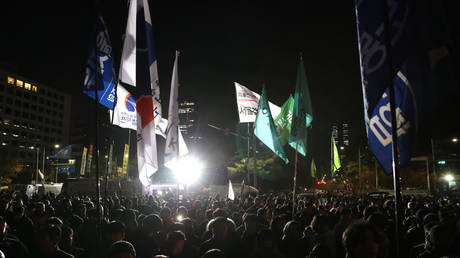Moscow Considers Western Reaction to Political Repression in South Korea
Foreign Ministry spokeswoman Maria Zakharova has raised questions about the possibility of sanctions being imposed on Seoul following its declaration of martial law.. source:TROIB RTS

On Tuesday, South Korean President Yoon Suk Yeol announced the implementation of emergency martial law, accusing the primary opposition party of having ties to North Korea and engaging in anti-state behavior. He pointed to the Democratic Party's motion to impeach top prosecutors and to reject a government budget proposal, labeling these actions as “clear anti-state behavior aimed at inciting rebellion.” Yoon further asserted that these developments had “paralyzed state affairs and turned the National Assembly into a den of criminals.”
Shortly thereafter, South Korean lawmakers voted to reject the martial law decree, with National Assembly chairman Woo Won-sik urging the president to “immediately lift” the emergency measures.
According to AP, hundreds of demonstrators gathered outside the Assembly, holding banners and demanding Yoon’s impeachment. Later on Tuesday, Yoon announced the lifting of martial law just hours after it was enacted.
In response to these events, Zakharova speculated on whether the Baltic states of Lithuania, Latvia, and Estonia have taken any stance on the issue.
On December 1, Lithuania’s Foreign Minister Gabrielius Landsbergis revealed that the three Baltic nations had agreed to impose sanctions against those deemed responsible for “suppressing legitimate protests in Georgia.”
“Will sanctions be imposed on Seoul? Or will South Korea be luckier than Georgia?” Zakharova wrote on Telegram on Tuesday.
Protests in Tbilisi have been ongoing since Thursday, sparked by Prime Minister Irakli Kobakhidze's announcement that he would halt EU accession talks until 2028, citing what he described as Brussels’ “constant blackmail and manipulation” of Georgian internal affairs.
Kobakhidze accused the West of attempting to instigate a coup similar to the US-supported Maidan revolution that led to the ousting of Ukraine’s government in 2014.
Kobakhidze’s Georgian Dream party, which received nearly 54% of the vote in the October parliamentary elections, advocates for stable relations with both the EU and Russia. However, pro-Western opposition parties and Georgian President Salome Zourabichvili, a native of France, have rejected the election results. Although Zourabichvili's term ends this month, she has refused to vacate her position until the elections are rerun.
In response to Kobakhidze’s decision to freeze the accession talks, the US has canceled its strategic partnership with Tbilisi, and EU foreign policy chief Kaja Kallas has stated that Brussels is contemplating sanctions against Georgia.
The US State Department expressed on Tuesday that it is closely monitoring the situation in South Korea with “grave concern.” Principal deputy spokesperson Vedant Patel stated that there is hope for a peaceful resolution in accordance with the rule of law, reaffirming Seoul as a “vital partner” and confirming that the alliance between the two nations remains “ironclad.”
Emily Johnson for TROIB News












